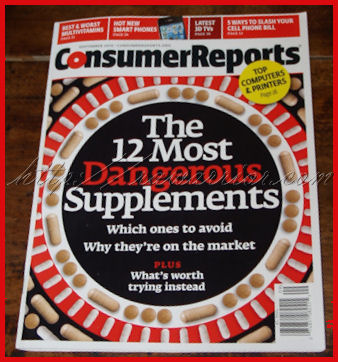Consumer Reports’ Dangerous Supplements List
I was in the grocery store a couple of weeks ago and I picked up the latest Consumer Reports magazine since the cover story on dietary supplements looked so intriguing.
Consumer Reports revealed some startling facts about vitamins and supplements sold in the United States.
1) “What consumers might not realize, though, is that supplement manufacturers routinely, and legally, sell their products without first having to demonstrate that they are safe and effective.”
 You may have heard me mention this one before. In the US, the Food and Drug Administration (FDA) requires drug manufacturers to follow strict guidelines. However, products sold as supplements are not required to prove any effectiveness or safety if they do not label their product as a drug. As long as the language on the package is carefully worded, supplement companies can claim almost anything without having to prove anything.
You may have heard me mention this one before. In the US, the Food and Drug Administration (FDA) requires drug manufacturers to follow strict guidelines. However, products sold as supplements are not required to prove any effectiveness or safety if they do not label their product as a drug. As long as the language on the package is carefully worded, supplement companies can claim almost anything without having to prove anything.
It seems like a misleading distinction between drugs and non-drugs. If a product is labeled as a drug, it means the product has been tested to the satisfaction of the FDA in order to obtain approval. If a supplement is not labeled as a drug, that does not mean that it is more safe or effective, just less tested.
2) “Because of inadequate quality control and inspection, supplements contaminated with heavy metals, pesticides, or prescription drugs have been sold to unsuspecting consumers. And FDA rules covering manufacturing quality don’t apply to the companies that supply herbs, vitamins, and other raw ingredients.”
Supplements have often been found to contain such impurities. What worries me about that is many patients take large doses of supplements. If there were an impurity, then they could ingest large amounts of it before knowing it. The FDA is not perfect, but it is a lot better than nothing.
Dosage uncertainty is a related problem. Inadequate quality control means that dosages are not guaranteed. Take folic acid as an example. If an RA patient needs 3 mg. of folic acid, he will have to take 8 tablets of OTC (over the counter) folic acid supplement (that’s 400mcg). If the OTC pills actually contain less folic acid than claimed, the patient will not get an adequate dose. But consider what happens if the pills contain more folic acid than the label states. It would not be dangerous to most patients who take 1or 2 tablets, but an RA patient who takes 8 pills every day is at greater risk. Too much folic acid could negate the effects of his DMARD treatment.
3) “Of the more than 54,000 dietary supplement products in the Natural Medicines Comprehensive Database, only about a third have some level of safety and effectiveness that is supported by scientific evidence, according to a review by NMCD experts. And close to 12 percent have been liked to safety concerns or problems with product quality.”
This means that two-thirds of the supplements have never been shown to be safe and effective in a scientific study. Various problems can occur because of this lack of testing. Patients may take supplements without adequate warning of side effects. Or they may trust supplements to replace tested medicines.
12 Supplements you should avoid
Here is Consumer Reports’ list of the 12 most dangerous supplements. CR does detail more about why these were chosen:
Aconite, Bitter orange, Chaparrel, Colloidal silver, Coltsfoot, Comfrey, Country mallow, Germanium, Greater celandine, Kava, Lobelia, Yohimbe.
11 Supplements to consider
Here are some supplements that Consumer Reports recommends as more likely to be safe and effective in certain circumstances. CR does provide details of why these supplements are on the list:
Calcium, Cranberry, Fish oil, Glucosamine sulfate, Lactase, Lactobacillus, Psyllium, Pygeum, SAMe, St. John’s wort, Vitamin D.
Why are “supplements” so much cheaper than “drugs”?
Supplement companies make millions of dollars selling hope to patients who want help without the high prices or side effects of prescription medicine. There are some good and valuable supplements, but research shows that many other supplements are dangerous or useless. Much of the expense of pharmaceutical drugs is related to the enormous cost of complying with the FDA regulations meant to bring an effective drug safely to market. That can include years of clinical trials costing billions of dollars.
Note: I don’t know how long it will last, but I found the Consumer Reports Dangerous Supplements article online. Often, CR charges to read an entire article; so after it’s archived, that may be the case.
Recommended reading:




by reading on, I found their index of what and why :
http://www.consumerreports.org/health/natural-health/dietary-supplements/supplement-side-effects/index.htm
Pingback: Group Link Post 07/17/2011 | KJsDiigoBookmarks